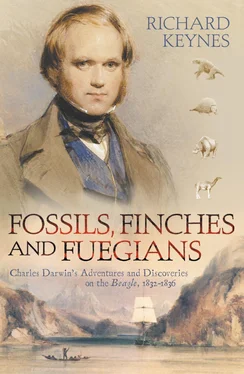Charles’s relations with FitzRoy were mostly very cordial, though he later recalled an example of the storms that could suddenly arise, and as quickly be quelled:
At Plymouth before we sailed, he was extremely angry with a dealer in crockery who refused to exchange some article purchased in his shop: the Captain asked the man the price of a very expensive set of china and said ‘I should have purchased this if you had not been so disobliging.’ As I knew that the cabin was amply stocked with crockery, I doubted whether he had any such intention; and I must have shown my doubts in my face, for I said not a word. After leaving the shop he looked at me, saying You do not believe what I have said, and I was forced to own that it was so. He was silent for a few minutes and then said You are right and I acted wrongly in my anger at the blackguard.
On 14 November FitzRoy moved his twenty-two chronometers on to the ship, but the paint was still wet in the poop cabin, so his books could not yet be arranged. A week later, Charles carried all his books and instruments on board the Beagle , after which two hard days’ work with Stokes reduced the poop cabin to ‘very neat order’. The Beagle had now sailed from Devonport to her moorings at Barnett Pool under Mount Edgcumbe ready for her final departure. On 28 November FitzRoy gave a magnificent luncheon for about forty people as a ship’s warming, with waltzing that continued until late in the evening.
On 4 December, in the first journal entry written on board ship, Charles wrote:
I intend sleeping in my hammock. I did so last night & experienced a most ludicrous difficulty in getting into it; my great fault of jockeyship was in trying to put my legs in first. The hammock being suspended, I thus only succeeded in pushing it away without making any progress in inserting my own body. The correct method is to sit accurately in centre of bed, then give yourself a dexterous twist & your head & feet come into their respective places. After a little time I daresay I shall, like others, find it very comfortable.
The next morning was tolerably clear, and sights were obtained, so now the Beagle was ready for her long-delayed moment of starting. But at midday a heavy gale blew up from the south, making the ship move so much that Charles was nearly sick, and ruling out any escape from the harbour. ‘In the evening dined with Erasmus,’ he wrote. ‘I shall not often have such quiet snug dinners.’ However, gales from that unlucky point south-west recurred daily, and Charles had more last dinners and one more walk to Mount Edgcumbe with Erasmus. On 10 December the wind dropped more hopefully, and the Beagle sailed at ten o’clock with Erasmus on board, dropping him off after doubling the breakwater. But in the evening the barometer gave notice of yet another gale, and after a wild and very uncomfortable night it was determined to put back to Plymouth and there remain for a more fortunate wind. Charles reflected ruefully that although he had done right to accept the offer of the voyage, ‘I think it is doubtful how far it will add to the happiness of one’s life. If I keep my health & return, & then have strength of mind quietly to settle down in life, my present & future share of vexation & want of comfort will be amply repaid.’
Two days later, while the weather still showed little sign of improvement, Charles made some serious resolutions:
An idle day; dined for the first time in Captain’s cabin & felt quite at home. Of all the luxuries the Captain has given me, none will be so essential as that of having my meals with him. I am often afraid I shall be quite overwhelmed with the numbers of subjects which I ought to take into hand. It is difficult to mark out any plan & without method on ship-board I am sure little will be done. The principal objects are 1 st, collecting observing & reading in all branches of Natural history that I possibly can manage. Observations in Meteorology. French & Spanish, Mathematics, & a little Classics, perhaps not more than Greek Testament on Sundays. I hope generally to have some one English book to hand for my amusement, exclusive of the above mentioned branches. If I have not energy enough to make myself steadily industrious during the voyage, how great & uncommon an opportunity of improving myself shall I throw away. May this never for one moment escape my mind, & then perhaps I may have the same opportunity of drilling my mind that I threw away whilst at Cambridge.
The wind remained obstinately in the wrong point, until on 21 December there was a light north-westerly which encouraged the Beagle to try again to depart. After going aground off Drake’s Island and taking several hours to get off again, the ship sailed out of the harbour, and once in the open sea Charles was soon overcome by sickness and retreated first to the Captain’s cabin and then to his hammock. But during the night the wind strengthened and shifted back yet again to the south-west, and Charles awoke to find himself once more back in Plymouth Sound.
On Christmas Day, Charles went ashore to church, to find an old Cambridge friend preaching. He then lunched in the gunroom, where the dullness of the conversation made him ‘properly grateful for my good luck in living with the Captain’. In the meantime the crew exercised their traditional custom of making themselves so drunk that Midshipman King was obliged to perform the duty of sentry. Boxing Day was greeted with an excellent wind for sailing, but the ship was still in a state approaching anarchy, with the worst offenders in heavy chains. At long last, on 27 December, the Beagle tacked with some difficulty out of the harbour, accompanied by the Commissioner Captain Ross in what Charles described as his ‘Yatch’. After lunching with Captain Ross on mutton chops and champagne, Lieutenant Sulivan and Charles ‘joined the Beagle about 2 o’clock outside the Breakwater, & immediately with every sail filled by a light breeze we scudded away at the rate of 7 or 8 knots an hour – I was not sick that evening but went to bed early’. The voyage of the Beagle had begun.
CHAPTER 4
From Plymouth to the Cape Verde Islands
During his first week at sea there was a heavy swell in the Bay of Biscay, and Charles suffered severely from sea-sickness, as he did throughout the voyage, noting gloomily that ‘I often said before starting that I had no doubt I should frequently repent of the whole undertaking. Little did I think with what fervour I should do so. I can scarcely conceive any more miserable state, than when such dark & gloomy thoughts are haunting the mind as have today pursued me.’ It did not help that his thoughts were also most unpleasantly occupied by his having had to witness the flogging of several members of the crew in punishment for their drunkenness on Christmas Day. Fifteen years later he wrote to FitzRoy:
Farewell, dear Fitz-Roy, I often think of your many acts of kindness to me, and not seldomest on the time, no doubt quite forgotten by you, when, before making Madeira, you came and arranged my hammock with your own hands, and which, as I afterwards heard, brought tears into my father’s eyes. 48
On 31 December the weather was milder, and Charles’s spirits were raised by his first sight of a shoal of porpoises dashing round the vessel, and a stormy petrel skimming over the waves. He spent the afternoon lying on the sofa in the Captain’s cabin, and reading Humboldt’s glowing accounts of tropical scenery, concluding that nothing could be better adapted for cheering the heart of a sea-sick man.
On 6 January 1832 the Beagle arrived at the Canary Islands, and anchored off the port of Santa Cruz on Teneriffe. Although some geographers had adopted the Peak of Teneriffe as a zero point from which to reckon longitude, FitzRoy considered that such a procedure was unsatisfactory because of a lack of data on the precise position of starting points in the neighbourhood of Teneriffe with respect to the Peak itself. However, immediately the anchor had been lowered, a boat carrying the British Vice-Consul and some quarantine officers came alongside with the news that because of reports on the occurrence of cholera in England, nobody would be permitted to land without first undergoing a rigorous twelve days of quarantine. FitzRoy felt that his objective could not be achieved without making observations on shore, and that such a delay was not acceptable, so up came the anchor and the Beagle made sail for the Cape Verde Islands. Knowing of Charles’s unfulfilled plans for an expedition to Teneriffe, FitzRoy wrote:
Читать дальше












